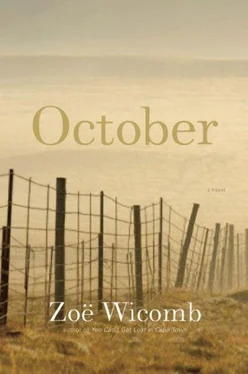Oh no, Mercia explains, the female simply scratches out a nest, lays her eggs, and wanders off so that the hatching takes place all by itself. The baby tortoise picks its way out of the eggshell and manages on its own, makes its way in the veld all by itself, finding its own food.
Nicky is sorry to hear that. He wants to know why. He would not like to be left by his mummy, left to find his own food. His mummy wouldn’t just leave him in the veld.
No, of course she won’t, Mercia says, taking his hand, because you’re a boy, not a tortoise. But you won’t stay with your mummy forever. Perhaps you’d like to come and stay with me for a while in Scotland?
Oh yes, he would, now that he can speak English, and blowing up his cheeks with the sound of a propeller, he shoots off at an angle, diving sideways. He would drive the airplane himself, he shouts.
When he returns from his flight the tortoise has wandered only a couple of feet. Nicky worries about its inability to run away from its enemies. Mercia knocks on the impregnable shell, turns the tortoise over to show him its undercarriage, and teaches him the words, carapace and plastron. See, she says, how it is protected from its enemies? It can always run indoors just by pulling in its head. The tortoise carries its house on its back.
Nicky would like to take it home. The tortoise won’t mind where it lives if its own home is on its back. Can we eat it? he asks. Mercia is horrified. Is that really what humans are programmed to think of, of destroying other creatures, of eating them? The thought makes her sick. She manages to say quietly that if he, Nicky, would not like to be eaten, the tortoise surely would not like it either, and that that is always a useful test. The child agrees, but then says triumphantly that if it has no children to care for, and if it carries its home on its back, it would surely not mind being taken home as a pet? Mercia says that they do not know what a tortoise likes to eat, what it likes to do, or whether it has friends it might miss. If it lives in the veld, that is where it prefers to be, so no, the test still holds. Would he, Nicky, like to be taken away as someone’s pet?
The child laughs. Yislaaik, he would fight his way out of a cage. Like this, and he demonstrates his fighting moves, thrusting his fists and rolling in the sand.
As they set off back home, he wags a finger. Now, he says, it is his turn to teach Auntie Mercy some Afrikaans. It is so much better to speak more than one language.
The child seeks her out, seems to look to Mercia for diversion. Come, let’s play, he says. She is panic-stricken. How? she asks. What is she to do? Nicky is on all fours, growling, expecting her to follow suit or to come up with something amusing. Mercia has no idea what such a game might be. Well, she says, playing for time, I don’t think I’d make a good lion. How about writing? she asks. Today he could learn to use a pen and to write his name. But Sylvie is worried; she wonders if Nicky is not too young to be burdened with schoolwork. Is that, she asks, the right thing to do at his age?
Mercia frowns. Actually, she doesn’t know; she imagines that children learn to write at different ages, so that there could be no harm if Nicky seems interested. It is simply a question of entertaining him with the alphabet, of offering an alternative to television. There surely is no need to think of reading and writing as labor if the boy enjoys doing it, she says. There is much laughter from Nicky, who screws up his face in concentration and tries with all his might to follow with colored pens her faint outline of the letters. He crows with delight as he gains control, as the wobbly lines spell his name. Then they sing together the alphabet song that Mercia summons from who knows where. She claps and sways along with him.
Now the child is indeed exhausted. His eyes droop, his head lolls as he slowly slides down into the cushions and slips into sleep. His arms are flung out on the old sofa, and he snores like an old man. Sylvie has gone to work, and Mercia does not know how long he should be allowed to sleep.
There probably is more to raising a child than common sense allows, and if Mercia is going to have any influence on him, she might as well start investigating. She looks about the room, hoping that a book on child care might be lying about. Jake has surely at some stage taken an interest in the boy, would have wanted to know what to do with him. She checks the corner, under the television, where books and papers are neatly stacked, but no, they are mail-order catalogs, magazines, and old newspapers. A large brown envelope slides out of the pile of disturbed papers; it is not sealed, and Mercia hesitates for a second before peering into it. They are photographs, which she cannot resist looking at. All of Sylvie as a young woman, taken at various intervals, some fifteen years or so ago, she guesses, before she put on weight.
Mercia frowns at the images, so radically different from the woman she knows, or rather from the current Sylvie. She is barely recognizable, but no, it is the same high Namaqua cheekbones, the narrow eyes and angled planes of the proffered face. The girl in the photographs is not only youthful and slender, but seems also unbelievably vain. She looks brazenly into the camera. The pictures are carefully posed, and clearly all taken by Sylvie herself. Dozens of pictures taken over a few years, Mercia surmises, nothing short of an autobiographical project, which for all her boldness makes the girl at the same time look vulnerable, exposed, and yes, she must admit, beautiful, with all the beauty of youth that is taken for granted by the young. Mercia has thought her to be a simple, uneducated country girl, one who talks too much, prone to whining, but modest all the same. Here, however, gathered in the envelope, is evidence of a confident, bold young woman brimming with self-awareness and striking various extravagant poses, a Sylvie transformed by the eye of the camera.
The brightest of the color photographs, one with patches of purple daisies, leaps out at Mercia. There is Sylvie in all her vulgar self-regard, the country girl’s take on glamour. The pose in cheap sunglasses and tight trousers is self-conscious; the ill-fitting shirt has sprung a button, presumably just before the click of the camera, so that the girl’s brassiere shows. But her head is tilted defiantly as if she has just been reprimanded by the aunties to stop her nonsense. It is true that she is slim, youthful, and surprisingly comely, the delicate face lifted to the sun. But what on earth could have possessed Jake to fall for the little tart?
Mercia is embarrassed by her reaction to the girl, or rather, to the pictures. Once upon a time one was able to say: I take back those words. Now that we know how our thoughts and utterances betray us, they can no longer be taken back. Unlike the evidence of fingerprints, they cannot be erased. If only the word tart had not entered her thoughts. Mercia remembers the day, some years ago, when Jake told her that he was going to marry the Willemse girl. She could not hide her dismay. Now there’s a surprise, she said, but why marry?
No, you’re not surprised. And marriage is not the issue. The truth, dear sissie, Jake cackled, is that you disapprove. You’re no different from the old man. You don’t even know Sylvie, but you do know that she’s not your kind, not good enough for your brother. You’ve become European, too grand for us; you don’t belong here anymore. How bourgeois you’ve become, Mercy, a fine liberal you are.
Mercia stared at him, tongue-tied. Once upon a time she used to think of bourgeois as a dirty word. But the truth was that over the years the label of bourgeois like a garishly colored garment had faded into something less offensive, something perfectly wearable. Acceptable, because she was wearing it. Considering who she was and how she lived her comfortable life, would it not be dishonest to claim otherwise? Mercia’s head spun. She would stand her ground.
Читать дальше












